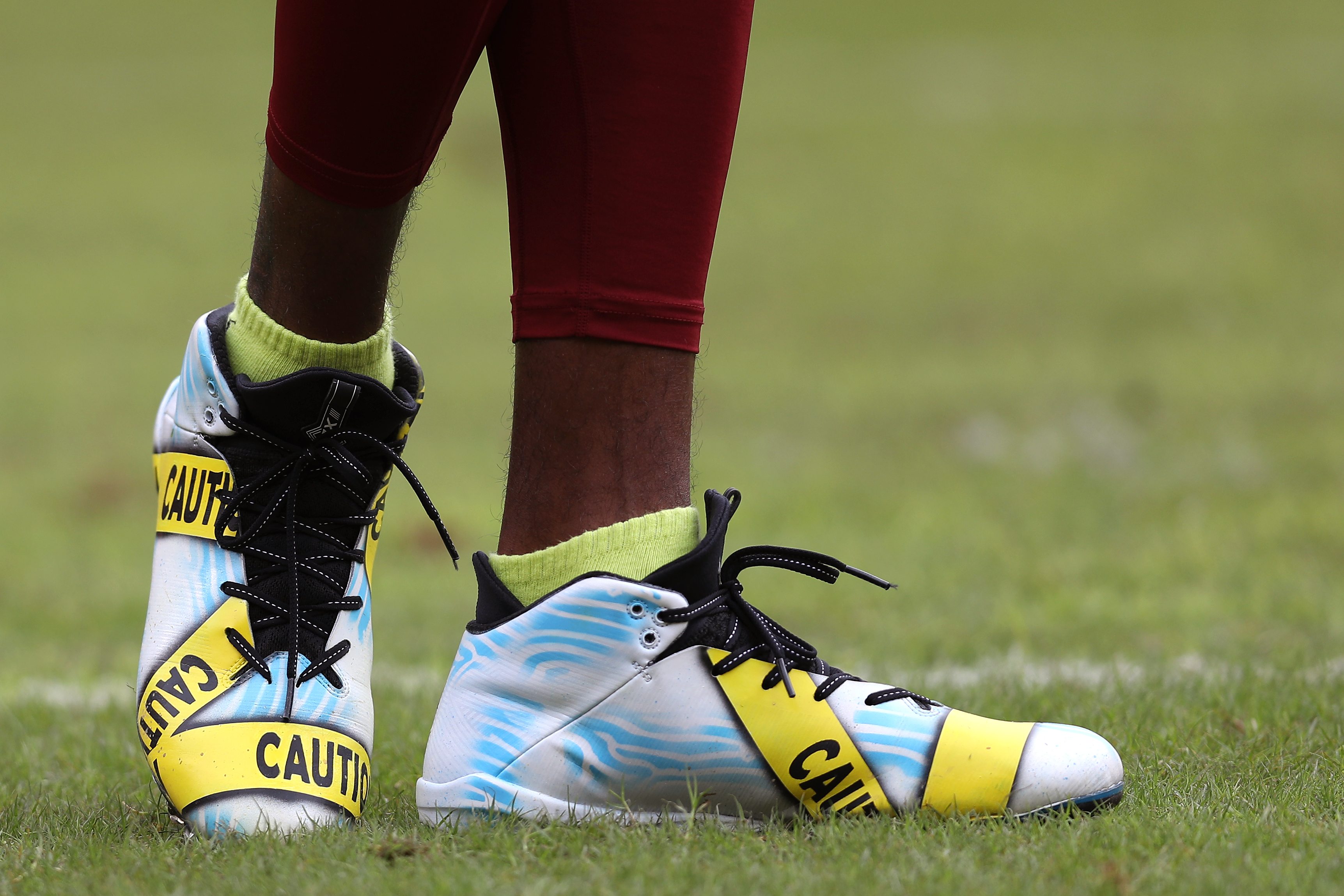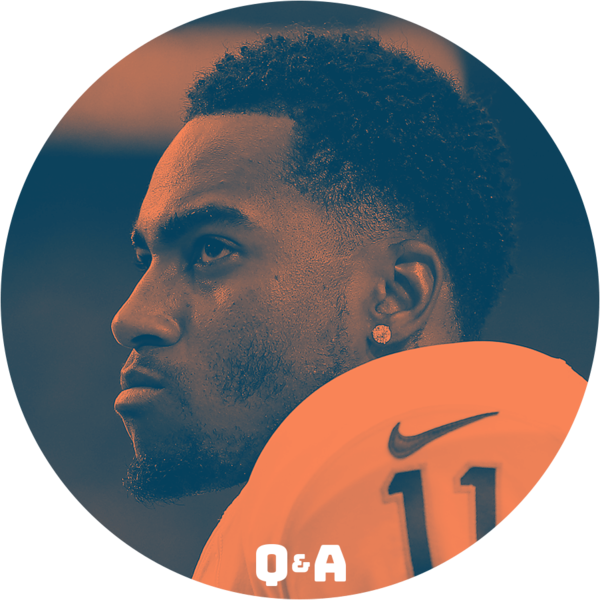An electrifying wide receiver in Washington, DeSean Jackson will turn 30 in December—right about the age when NFL players start to contemplate their football mortality and visualize life after they hang up their cleats. But before Jackson hangs his up, he’s using them to send a message—and create change.
Last Sunday, during pregame warm-ups, Jackson wore custom cleats with a yellow caution tape design. Citing Colin Kaepernick’s protest, Jackson said he appreciates the fortitude it takes for his colleague to stand up for his convictions. While growing up in Los Angeles, Jackson was witness to police brutality, gang violence (which, in part, was the idea for wearing the custom cleats) and the deterioration of after-school programs for kids in the inner cities. Withstanding the potential ostracism from those who would misconstrue his message as anti-police or anti-military, he has begun to plan next steps for tangible change. He wants this movement to be one of unification and anticipates working with other athletes from all sports, organizations, police departments—essentially anyone who wants to be a part of the solution.
These are a few of the beginning steps to building what he calls his “master plan.” As a former Washington wideout, I connected with Jackson to explore the movement he’s building in hopes of gleaning a better understanding of how he arrived at his current mindset and how he plans to facilitate change. — Donté Stallworth

Washington wide receiver DeSean Jackson wears cleats displaying police caution tape prior to a game against the Cleveland Browns at FedExField on October 2, 2016. (Getty Images)
DONTÉ STALLWORTH: YOUR CLEATS SPARKED A LOT OF CONVERSATION THIS WEEK. WHAT’S THE HEART OF YOUR MESSAGE?
DeSean Jackson: I felt like I was silent long enough. This is my ninth NFL season. I have a platform and the visibility to take a stand and do it in the right way. I reached a point where I was tired of seeing the hashtags, the RIPs, the senseless killings. The things that are going on are just mind-boggling. When I was growing up, caution tape would be in my hood. That's what you get when somebody dies. They put yellow tape around. Enough is enough. It took some time and a little courage to do this. I just want my message to get across to people.
THE REACTIONS TO THE SILENT PROTESTS AROUND THE LEAGUE HAVE BEEN PRETTY STRONG. HOW DO YOU FEEL ABOUT THAT?
A lot of people get upset by any protest—people taking a knee during the national anthem or raising a fist. As if we're being disrespectful. Or rude to the national anthem or to our soldiers, you know what I'm saying? It's deeper than that. I love what the service men and women are doing for us and for our freedom. But, all of a sudden, now it's like, “Oh my God, all the cameras are on my cleats.” All this attention. It's crazy that you have to do all this just to get this stuff stirred up in that light. The moment I step out, it's “He's going to get fined for that,” or "That's the wrong message.” If I take a stand for something, then it's an issue. “Oh, he's about to get fined for that.” Why does the fine matter? Why does it matter in the course of what I'm trying to do? It isn't about the fine. I am just trying to figure out something where we can come together as a movement.
IT’S MORE THAN A MESSAGE. IT’S A MOVEMENT. HOW WILL YOU BUILD THAT?
I've been talking with my brother Richard Sherman. You know me and him kind of grew up together [Jackson is from L.A.; Sherman is from Compton], so we have a real connection. When we grew up, we had YMCAs. Organizations and places where kids went to play. Nowadays, from when school lets out, kids don't have anywhere to go. So they see who's the toughest and do this and that. We want to change that mindset.
WHAT KINDS OF CONVERSATIONS ARE YOU HAVING WITH SHERMAN ABOUT THIS MOVEMENT?
In a nutshell, it's about creating a culture of unity. We're trying to put together a nonprofit organization where we can get kids together. We’ll talk to these kids and will try to change their mentality. Their hunger and having that hustle mentality—we’ll help to put it toward something legal. You know, go to school and get in a program where you can play ball. If you can't play ball, go to school where you can be a doctor or a lawyer. We might not save all their lives, but we might save 50. We can start it in California, but we want to take it worldwide. We want to go to Chicago. We want to go to Detroit. We want to go to Oakland. Right now it's hard, because we're playing football for so long. But with four or five months during the offseason, we still have time to do it.
YOU’RE THINKING ABOUT THE POTENTIAL GLOBAL REACH OF THIS ORGANIZATION. WILL YOU AND RICHARD COLLABORATE WITH OTHER PLAYERS OR ORGANIZATIONS FOR THIS?
We talked to the NFLPA, our teammates and the Washington Redskins. We've seen a lot of hashtags, but for all the supporters, people protesting and all these people that want to make it look good, it's gotta go forward farther than that. That's why I really salute Colin Kaepernick. I'm not going to take a knee, but I am going to make a stand. I am going to support what he's doing because he does have a right. I respect him because he did more than just take a knee. He [pledged to donate] his own money—over $1 million so far. That's the type of stuff it's going to take to move forward.
I really salute Colin Kaepernick. I'm not going to take a knee, but I am going to make a stand.
— DESEAN JACKSON
If you have people who want to be with the movement and raising fists or taking a knee, that's a start. But where are you going to go after that? Are you going to donate some of your own money, which I intend to do? Are you going to start an organization where you can help go talk to these kids and make a difference? Hopefully we can get front office executives to support this too. Dan Snyder and the Redskins organization, that's the direction I'm trying to go in. Teams need to do a lot of this stuff in the inner-city communities. You have to get to the cultures that are hurting right now.
WHAT’S THE SUPPORT LIKE IN THE LOCKER ROOM?
A lot of guys are worried about their jobs, worried they might get cut if they take a stand. Niles Paul, Greg Toler and Rashad Ross and I came together and raised our fists when we played the Giants in New York. The guys who stood there with me—that showed me a lot of courage. Our raised fists brought some attention to our team. We didn't really want to be standouts. We didn't want to separate from the team. We wanted to feel like we are all together. We didn't want to make it racial. Some guys were scared to do it, though. Certain guys we asked to do it said, "Nah, I'm not messing with that." Guys that might not be financially stable. I feel like I'm financially stable, and regardless if this would jeopardize my career or my job, the bigger picture is we need more guys like Colin Kaepernick who will take a stand.
I applaud guys like that. I saw Antonio Cromartie was just released. He took a knee when they played in London. I don't think it had anything to do with him taking a knee before the game, but it kind of raises eyebrows. I looked at it a little closer because it might have something to do with it.

Rashad Ross, DeSean Jackson, Niles Paul and Greg Toler raise their fists during the national anthem prior to Washington's game against the New York Giants at MetLife Stadium on September 25, 2016. (Getty Images)
PLAYING IN THE NATION’S CAPITAL, DO YOU HAVE PLANS TO WORK WITH POLICYMAKERS AS YOU BUILD YOUR ORGANIZATION?
Being here in D.C., it's a step closer to getting it to Congress and having meetings with police, something that was offered by [team president] Bruce Allen here. He told us if we did want to meet that he could set that up for us. But I want to start up first and get to that point where I can have the groundwork ready to go. From there, Richard Sherman, myself and other guys can hopefully take it to the next step, have other guys in the NFL brotherhood up and just ready to go and save these lives, make a difference in the community, change the thinking from cops to black-on-black to crime, the whole nine. It's a lot on my plate, but I feel like with the help and research, [this organization] can definitely change the minds and lives of a lot of young kids, adults and even the police. I'm excited about it.






